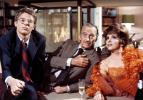Reviews
Jerzy Skolimowski
France / UK, 1984
Credits
Review by Ian Johnston
Posted on 16 August 2011
Source Arrow VHS
Categories Jerzy Skolimowski: Eros & Exile
Success Is the Best Revenge was Skolimowski’s follow-up and companion-piece to Moonlighting. Both films are London-set (indeed, both use Skolimowski’s own house as a major setting); both are explicit reactions to the political crisis in Poland and General Jaruzelski’s declaration of martial law; and both feature quintessentially English actors playing Poles: whereas in Moonlighting it was Jeremy Irons playing construction foreman Nowak, here we have Michael York as exiled theatre director Alexander Rodak.
In other respects, however, no two Skolimowski films could be further apart. You could say that on Moonlighting Skolimowski was on his best behaviour: it’s a perfectly controlled, evenly toned gem that achieves its aims with the minimum of effects and the maximum of effectiveness. Success is another beast entirely. It’s the one film of his international career that, stylistically and thematically, is fully in the spirit of his Polish films of the 1960s. This is Wild Jerzy, ready to run off the rails at any moment as a multitude of ideas, images, sounds, stories, and characters fizz and spark off one another. Chronology gets shuffled, any coherent driving narrative is deliberately fragmented, individual scenes can appear abstracted and disconnected from the film as a whole, and distorted and ambient sounds will be brought in and out to obscure snatches of explanatory dialogue. Because of this plenty of critics have complained that the film is a stylistic mess or even a failure—but don’t believe a word of it: Success Is the Best Revenge is thrilling cinema.
For all the film’s narrative obliqueness and ellipses there’s no difficulty in parsing out the story: Alexander Rodak, trapped in Warsaw since the declaration of martial law, has been allowed out to receive a Légion d’honneur in Paris (opportunity for a Michel Piccoli cameo) and then returns to his home in London and his resentful wife Alicja and disaffected son Adam; another son Tony has a very minor role. In London he works at staging a theatrical happening on the situation in Poland and is ultimately forced to turn to another exile, wealthy entrepreneur Dino Montecurva (John Hurt in fine sleazy form), for extra finance. Along the way there’s a traffic encounter that ends up in court and visits from a local building inspector. Meanwhile, Adam decides to take the opposite route to his father, making his stand on Poland by returning to Warsaw.
The autobiographical elements to this are clear enough, and are made even clearer by Skolimowski’s shooting the film in his own house1 and casting his own family: Alicja Rodak is played by Skolimowski’s wife Joanna Szczerbic (she was the tram driver in Barrier), and he gave the roles of Rodak’s sons Adam and Tony to his own sons Michael Lyndon (i.e. Michał Skolimowski) and Jerry Skol (Jerzy Junior). There are times when you wonder, for example, to what extent Joanna Szczerbic, rather than playing any carefully scripted role as Alicja, is more giving vent to her own feelings as the woman who abandoned her own acting career to bring up the sons she had with Skolimowski. She’s mostly kept to the periphery of the narrative or positioned between other characters; but watch how she closes her eyes as Alex - probably for the umpteenth time - tells a little dinner-table story; note the look of exasperation at Alex’s flirting, at the same dinner-table, with Anouk Aimée’s theatre producer Monique des Fontaines; and observe the deeper level of resentment she expresses at being left on her own to bring up their two sons, these “two cosmopolitan idiots.” These are brief moments in the film that allow a raw intensity of feeling to percolate up, the result of Szczerbic’s own presence, I suspect, rather than an intentional effect on Skolimowski’s part at the scripting stage.
Skolimowski’s son Michael Lyndon not only has a central acting role but was critical in the film coming into being in the first place. The story goes that Skolimowski found his son’s diary and on reading it (what took place in the Skolimowski household after that?) realised his son’s deep unhappiness at being cut off from his homeland. He encouraged Michael to write a fictionalisation of his own experience and incorporated it as one of the two narrative strands of the film, setting off that of the son against the father. In Success Is the Best Revenge son Adam’s story sets the tone, right from his cry of “Bullshit!” that breaks into the opening credits. (The still shot of Michael Lyndon that comes up in the closing credits is another thing entirely—in fact, a loving tribute from father to son.)
Adam’s open rebellion against his father then marks the first two sequences. He sabotages the sound recording at Alex’s award ceremony and turns participation with other Poles in a local football match into an Oedipal struggle played out over the increasingly muddy ground. “Who is he?” his voiceover offers as a summing-up of his - as he says - “loser” father: “A lousy football player.” And a later friendly race between father and son ends with Adam’s promise that “this is the last time you’ll beat me.” In this struggle between Adam and Alex we see played out what is a consistent thematic of Skolimowski’s cinema, the revolt of the son against the father(s), a scenario where Skolimowski, no matter his age, is firmly on the side of the son even when, as in the case of Success, that character is based on and played by his own son in revolt against himself.
To be honest, Adam’s narrative strand - diatribes against his father, bunking off school, first sex with his girlfriend - is a touch jejune, and it’s fortunate that his adolescent whining is balanced by the equal time given to his father. Adam and Alex are in the end mirror-images of each other. A critical edge is brought to bear on both of them, although Skolimowski still indulges the idealism of youth more than the confusions and self-deceptions of middle-age. Both do have very different approaches to the issue of how the Pole in exile responds to the events “at home,” but both finally are equally self-absorbed, blindly romantic, and ultimately doomed—Skolimowski’s concluding irony is that in neither case is there any chance of success.
- A house that Skolimowski as his own producer mortgaged and lost to the bank.↩
More Jerzy Skolimowski: Eros & Exile
-

The Shout
1978 -

Moonlighting
1982 -

The Lightship
1985 -

Success Is the Best Revenge
1984 -

Torrents of Spring
1989 -

King, Queen, Knave
1972
We don’t do comments anymore, but you may contact us here or find us on Twitter or Facebook.



